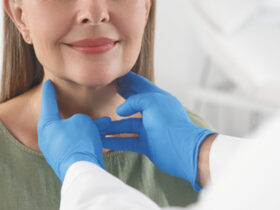Since November is American Diabetes Month, there’s no better time like the present to address the widespread epidemic affecting
our country. Diabetes affects over 30 million Americans and is the 7th leading cause of death. What’s even more staggering is that folks with diabetes are 2 to 4 times more likely to die of a cardiac episode than those individuals without high blood sugar.
If you are prediabetic or have diabetes, it’s imperative that you see a cardiologist. With diabetes, cardiac episodes are not a matter of “IF,” but rather a matter of “WHEN!”
Glucose And Your Heart
Concerning your heart’s health, sugar (glucose) raises your risk for heart disease by contributing to metabolic syndrome. Metabolic syndrome is a condition in which the insulin and leptin levels are high and resistant. Usually, high blood pressure, high cholesterol, high triglycerides and visceral fat are prevalent in diabetics, which leads to heart disease and coronary disorders.
Insulin is a hormone that helps move sugar into the blood for energy, in the case of an insulin resistant person, they have too much sugar, and the body cannot adequately utilize the source. This leads to weight gain, obesity, and subsequently, a more sedentary lifestyle. Leptin is a hormone that helps regulate body weight by sending signals to the hypothalamus in the brain. When the signals are distorted, the body becomes leptin resistant, and a person may often feel extremely hungry and irritable, which contributes to a vicious cycle of overeating foods that are high in sugar and unhealthy fats.
Metabolic syndrome is a significant factor in heart disorders, and in recent years, metabolic syndrome has become a commonly identified risk factor for cardiovascular disease because a vast amount of Americans are overweight and their entire bodies are literally inflamed; this inflammatory response affects their vascular structures. When the vessels are circulating high-glucose blood, atherosclerosis occurs at a greater intensity. Atherosclerosis is a build-up of plaque and causes a hardening of the arteries.
Why are so many Americans affected by diabetes? The average person consumes 30 teaspoons of sugar per day. It’s hiding in everything from salad dressings to low-fat baked goods to crackers. Unfortunately, Sugar has become a major staple in the American diet. The normal fasting blood sugar levels are anywhere from 70-99 mg/dl. The normal A1C, which measures the blood glucose level, should be below 5.7%.
Type I Diabetes Complications
• Cardiovascular Disease and Elevated Risks
• Eye disease and conditions
• High blood pressure
• High cholesterol
• Kidney disorders
• Low blood sugar
• Stroke risks
Type II Diabetes Complications
• Alzheimer’s and Dementia
• Amputations
• Heart Disease
• Kidney disease
• Neuropathy
• Non-Healing ulcers
• Skin Conditions
• Stroke Risks
• Vascular disease
• Vision loss and disorders
Even for individuals that are responsible, and are treating their diabetes with medication and have balanced levels of glucose, their risk for cardiovascular disease is still at a higher level than most other patients. Why? Their metabolic syndrome directly affects their risk factors.
Metabolic Syndrome in Diabetics Triggers
• High Lipid Counts
• Being Overweight
• Poor Diet (Sugar Cravings)
• Visceral fat
• Abdominal fat
• High blood pressure
• Lack of exercise
What You Can Do
Along with your physicians dietary and exercise recommendations, getting your blood sugar levels lowered with medication is the first step for people with Diabetes. The other important factor is to stop smoking, as this causes additional arterial weakening and atherosclerosis.
Losing weight and keeping stress levels low will also help with alleviating the side effects of diabetes. If you have diabetes or any heart-related symptoms, please call to make an appointment with a cardiologist today. It’s too risky to take a wait and see approach; your health is more important than your convenience.
At the Cardiac Care Group in Cape Coral, they provide a wide range of services that focus on the prevention, prompt diagnosis, and state-of-the-art treatment of cardiovascular disease. They pride themselves on being an exceptional practice where patients come first. All of their physicians and medical staff are highly trained professionals, maintaining the highest level of accreditation in cardiology to address the unique needs of those they are privileged to serve.
Don’t Ignore Your Symptoms! If you or someone you know needs to have a cardiology consultation, are concerned about your risk factors, or are experiencing symptoms of chest discomfort, shortness of breath or other related issues, please contact them at (239) 574-8463
Dr. Joseph Freedman MD, MBA brings many years of experience as a cutting edge cardiologist specializing in the prevention, diagnosis, and treatment of all cardiac disease. He trained at the prestigious Cleveland Clinic, continually ranked #1 in Cardiovascular Care, where he focused on
cardiac imaging. He achieved five board certifications in Internal Medicine, Cardiology, Comprehensive Adult ECHO, Nuclear Cardiology and Cardiac CT. During his tenure as the lead noninvasive cardiologist at Florida Medical Center in Ft. Lauderdale, he helped lead the hospital to achieve Level 5 chest pain certification, the highest designation of cardiac excellence.
He has spoken on national health care radio programs and has appeared on local news, highlighting the latest in cardiovascular care. Dr. Freedman prides himself on being an advocate for the patient. Every patient is unique, and he works carefully with leading local and national experts to make sure patients receive the best specialty procedural care possible for that particular case. Dr. Freedman has done research in cardiac MRI studies of the heart, in nuclear scanning, and has participated in the research trials of several leading cholesterol-lowering drugs. Dr. Freedman also has extensive experience in pulmonary hypertension and ran a large clinic in Broward County for these specific and often undiagnosed patients. Dr. Freedman speaks Spanish as well.
Cardiac Care Group
3208 Chiquita Blvd S., Suite 110
Cape Coral, FL 33914
(239) 574-8463
www.flccg.com
This information is for educational purposes only and is not intended to replace the advice of your doctor or health care provider. We encourage you to discuss with your doctor any questions or concerns you may have.







